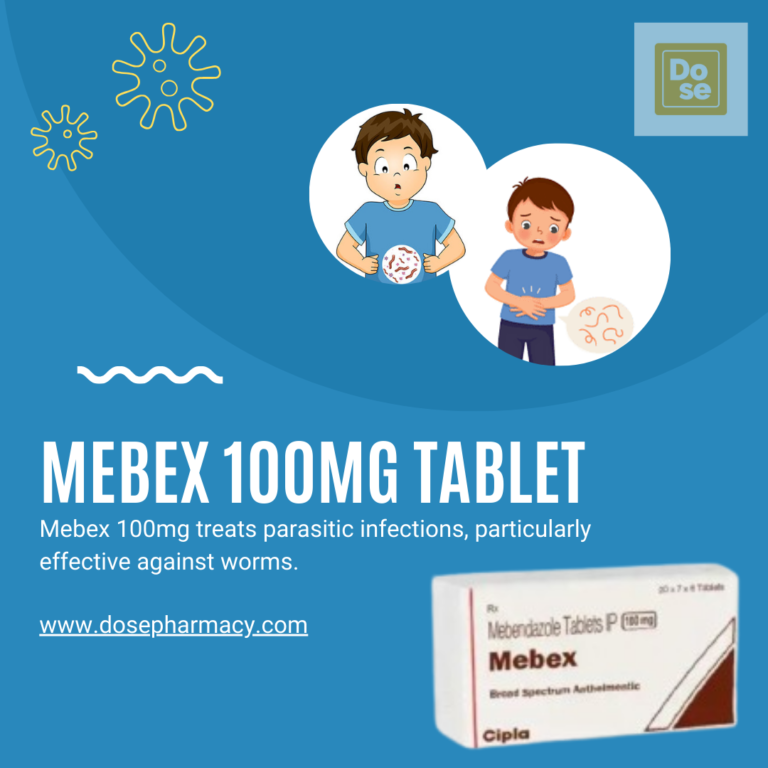Worm infections are a widespread health concern, particularly in regions with limited access to clean water and sanitation. These infections, caused by intestinal parasites like pinworms, roundworms, and whipworms, can lead to discomfort and health complications if left untreated. Mebendazole price is a reliable and widely used medication designed to treat these common parasitic infections effectively. This guide will provide a comprehensive understanding of Mebendazole, its uses, dosage, effectiveness, and safety considerations for treating worm infections.
What is Mebendazole?
Mebendazole is a broad-spectrum anthelmintic (anti-worm) medication used to eliminate various parasitic worms that infect the human gastrointestinal system. It works by disrupting the worms’ ability to absorb glucose, which is their primary source of energy. Without glucose, the worms gradually lose energy, die, and are expelled from the body through natural bowel movements.
Mebendazole is available in different forms, including tablets and chewable options, and is included on the World Health Organization’s (WHO) list of essential medicines due to its proven safety and effectiveness.
Common Worm Infections Treated by Mebendazole
- Pinworm Infection (Enterobiasis)
Pinworms are small, white worms that commonly infect children. The primary symptom is intense itching around the anal area, especially at night. Mebendazole is highly effective in eradicating pinworm infections with a single dose, often requiring a repeat dose two weeks later to prevent reinfection.
- Roundworm Infection (Ascariasis)
Roundworms can grow several inches long and cause symptoms like abdominal discomfort, bloating, and malnutrition. Mebendazole works by paralyzing and killing these worms, allowing the body to expel them naturally.
- Whipworm Infection (Trichuriasis)
Whipworms can cause diarrhea, abdominal pain, and even anemia in severe cases. Mebendazole is used to eliminate whipworms effectively, typically as part of a deworming program in endemic areas.
- Hookworm Infection
Hookworms attach to the intestinal wall and feed on blood, leading to anemia and weakness. Mebendazole disrupts their energy supply, killing the worms and clearing the infection.
- Other Parasitic Worms
While primarily used for intestinal worms, Mebendazole may also be prescribed for other parasitic infections, such as certain tapeworms or mixed worm infestations.
Dosage and Administration
Mebendazole is available over-the-counter or by prescription in many countries. It is essential to follow the prescribed dosage to ensure effective treatment and avoid resistance.
Standard Dosages:
- Pinworms: A single 100 mg dose, repeated after two weeks if reinfection is suspected.
- Roundworms, Whipworms, and Hookworms: 100 mg twice daily for three consecutive days.
Mebendazole can be taken with or without food. Chewable tablets should be chewed thoroughly before swallowing, or crushed for younger children if necessary.
Special Considerations:
- Children: Mebendazole is generally safe for children over two years old. Consult a healthcare provider for younger children.
- Pregnancy and Breastfeeding: It is not typically recommended during pregnancy, especially in the first trimester, unless deemed necessary by a healthcare provider.
Effectiveness of Mebendazole
Mebendazole has a high success rate in eradicating worm infections when taken correctly. For instance, its effectiveness in treating pinworms exceeds 90% after a single dose. However, reinfections are common in pinworm cases due to environmental contamination. Proper hygiene practices and repeat dosing can minimize the risk of recurrence.
In areas with widespread parasitic infections, mass deworming programs using Mebendazole have significantly reduced the prevalence of worm-related diseases, improving overall public health.
Side Effects and Safety
Mebendazole is generally well-tolerated, but some individuals may experience mild side effects, including:
- Stomach pain or cramps
- Nausea
- Diarrhea
- Headache
Severe side effects are rare but may include allergic reactions such as rash, itching, or swelling. If any severe reactions occur, immediate medical attention is required.
Who Should Avoid Mebendazole?
- Individuals with known allergies to Mebendazole or its components.
- Pregnant women, especially in the first trimester, unless specifically advised by a doctor.
Preventing Reinfection
Treating a worm infection is only part of the solution. Preventing reinfection is equally critical, especially in households or environments where the parasites are widespread.
Hygiene Practices:
- Wash hands thoroughly with soap and water, especially after using the toilet and before meals.
- Trim fingernails to prevent eggs from lodging under them.
- Wash bedding, clothes, and towels regularly in hot water.
- Clean and disinfect household surfaces, particularly in bathrooms.
Dietary and Environmental Measures:
- Avoid consuming raw or undercooked meat, as some parasites can be transmitted through contaminated food.
- Drink clean, boiled, or filtered water.
- Practice proper sanitation, including the use of clean toilets.
The Role of Mebendazole in Public Health
Mebendazole is a cornerstone medication in global efforts to control and eliminate parasitic infections. Mass deworming programs, particularly in schools, have demonstrated remarkable success in reducing the prevalence of worm infections in endemic areas. These programs have improved the health, growth, and cognitive development of children, contributing to their long-term well-being.
When to Seek Medical Advice
While Mebendazole is highly effective, persistent symptoms or severe infections may require additional medical attention. Consult a healthcare provider if:
- Symptoms persist or worsen after treatment.
- Severe side effects occur.
- The infection recurs frequently despite taking preventive measures.
Conclusion
Mebendazole is a highly effective and accessible medication for treating common worm infections such as pinworms, roundworms, whipworms, and hookworms. Its broad-spectrum activity, safety profile, and affordability make it a valuable tool in both individual treatment and public health initiatives.
Proper hygiene, environmental sanitation, and adherence to prescribed treatment regimens are essential to prevent reinfection and ensure long-term success. If you suspect a worm infection, consult a healthcare provider to determine the appropriate course of treatment. With Mebendazole and the right preventive measures, worm infections can be effectively managed and eradicated.
